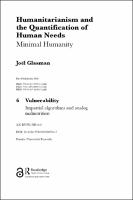Chapter 6 Vulnerability
Proposal review
Impartial algorithms and analog malnutrition
| dc.contributor.author | Glasman, Joël | |
| dc.date.accessioned | 2021-10-20T08:22:12Z | |
| dc.date.available | 2021-10-20T08:22:12Z | |
| dc.date.issued | 2019 | |
| dc.identifier.uri | https://library.oapen.org/handle/20.500.12657/51119 | |
| dc.description.abstract | This book provides a historical inquiry into the quantification of needs in humanitarian assistance. Needs are increasingly seen as the lowest common denominator of humanity. Standard definitions of basic needs, however, set a minimalist version of humanity – both in the sense that they are narrow in what they compare, and that they set a low bar for satisfaction. The book argues that we cannot understand humanitarian governance if we do not understand how humanitarian agencies made human suffering commensurable across borders in the first place. The book identifies four basic elements of needs: As a concept, as a system of classification and triage, as a material apparatus, and as a set of standards. Drawing on a range of archival sources, including the United Nations Refugee Agency (UNHCR), Médecins sans Frontières (MSF), and the Sphere Project, the book traces the concept of needs from its emergence in the 1960s right through to the present day, and United Nations Secretary-General Ban Ki-moon’s call for “evidence-based humanitarianism.” Finally, the book assesses how the international governmentality of needs has played out in a recent humanitarian crisis, drawing on field research on Central African refugees in the Cameroonian borderland in 2014–2016. This important historical inquiry into the universal nature of human suffering will be an important read for humanitarian researchers and practitioners, as well as readers with an interest in international history and development. | en_US |
| dc.language | English | en_US |
| dc.subject.classification | thema EDItEUR::G Reference, Information and Interdisciplinary subjects::GT Interdisciplinary studies::GTP Development studies | en_US |
| dc.subject.classification | thema EDItEUR::J Society and Social Sciences::JB Society and culture: general::JBF Social and ethical issues::JBFF Social impact of disasters / accidents (natural or man-made) | en_US |
| dc.subject.classification | thema EDItEUR::R Earth Sciences, Geography, Environment, Planning::RG Geography::RGC Human geography | en_US |
| dc.subject.other | basic needs, evidence-based humanitarianism, humanitarian agencies, humanitarian assistance, minimal humanity | en_US |
| dc.title | Chapter 6 Vulnerability | en_US |
| dc.title.alternative | Impartial algorithms and analog malnutrition | en_US |
| dc.type | chapter | |
| oapen.identifier.doi | 10.4324/9781003006954-7 | en_US |
| oapen.relation.isPublishedBy | 7b3c7b10-5b1e-40b3-860e-c6dd5197f0bb | en_US |
| oapen.relation.isPartOfBook | 551dc25f-5177-41c7-8964-592302e514b5 | en_US |
| oapen.relation.isbn | 9780367464165 | en_US |
| oapen.relation.isbn | 9781003006954 | en_US |
| oapen.imprint | Routledge | en_US |
| oapen.pages | 33 | en_US |
| oapen.remark.public | Funder name: Universität Bayreuth | |
| peerreview.anonymity | Single-anonymised | |
| peerreview.id | bc80075c-96cc-4740-a9f3-a234bc2598f1 | |
| peerreview.open.review | No | |
| peerreview.publish.responsibility | Publisher | |
| peerreview.review.stage | Pre-publication | |
| peerreview.review.type | Proposal | |
| peerreview.reviewer.type | Internal editor | |
| peerreview.reviewer.type | External peer reviewer | |
| peerreview.title | Proposal review | |
| oapen.review.comments | Taylor & Francis open access titles are reviewed as a minimum at proposal stage by at least two external peer reviewers and an internal editor (additional reviews may be sought and additional content reviewed as required). |

